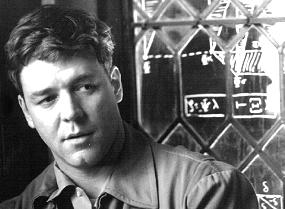| Irrational Numbers | ||
| A Beautiful Mind | ||
 |
||
| Review by Ross Anthony | ||
|
The film begins with momentum. Young mathematics
geniuses attend competitive graduate classes at a
prestigious university. Russell Crowe plays John Nash
(the real life subject of this story). Somewhat
socially undeveloped, with little time for small
talk, he speaks his beautiful mind directly,
indulging in effectively jagged sarcasm towards the
local favored scholar. While the others complete
their courses and publish works, Nash pencils
theories and conjectures on the All too soon, Nash finds a workable postulate and graduates into a research professorship at the lab/university of his choosing where he becomes involved with top secret government decoding and a young college coed. The humor of his rough-edged socializing and courting make a much more interesting film than that which "Beautiful Mind" actually becomes ... and that would be a psychological thriller. Taking a few lighter tangents from its foci, the film teases the audience with wonderful scenes of this nature: Nash reluctantly stumbles into a calculus class that he feels somehow forced to teach. His first day commentary, "This class will be a waste of your, and what is infinitely worse, my, time." After which he lazily slides the textbook off the podium into the trash. Unfortunately, fresh moments like this slip to the back of the class. Then, dabbling with a mostly fresh and original romance (though a hokie starlit scene seeps in), "Beautiful Mind" begins settling into the psychological thriller it eventually decides to be. Is Nash really working for the FBI operative played by Ed Harris, or is Nash delusional? Though all perform marvelously, the eventual focus is so vastly different from the light and quirky first act, many viewers may feel disoriented by the switch in genre and lose interest in the film as a whole. An interesting quote from director Ron Howard, "There's an element of danger with an number of these actors - especially Russell Crowe, Ed Harris and Christopher Plummer. They project an unpredictably and volatility that might surprise people in a movie perceived as human interested or intellectual. There's always a palpable, visceral tension with them onscreen." |
||
|
|
||
|
||
Grade..........................B- |
||
Copyright © 2001. Ross Anthony, currently based in Los Angeles, has scripted and shot documentaries, music videos, and shorts in 35 countries across North America, Europe, Africa and Asia. For more reviews visit: RossAnthony.com |
||
|
 Victorian windows of
the university library. Solitarily disregarding
standard student responsibilities, Nash studies the
movements of pigeons or strategies of boys hitting on
women -- searching for that one sweet original
idea.
Victorian windows of
the university library. Solitarily disregarding
standard student responsibilities, Nash studies the
movements of pigeons or strategies of boys hitting on
women -- searching for that one sweet original
idea.




